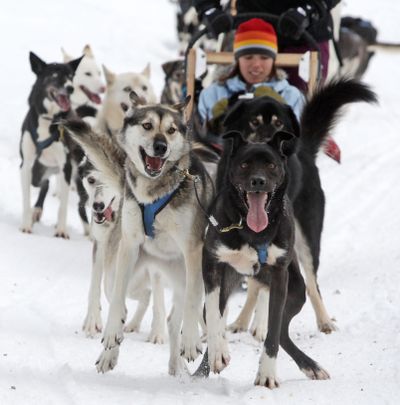100 dogs in Canada killed after business slows

VANCOUVER, B.C. — An organization that fights animal abuse called the slaughter of about 100 sled dogs, some badly maimed and writhing in pain, by an outdoor adventure company in British Columbia a bloodbath, and police are investigating.
The gruesome event was described in documents awarding compensation to a worker who claimed post-traumatic stress disorder for having to shoot the dogs after bookings dropped sharply for a tour operator following the 2010 Winter Olympics.
Marcie Moriarty, general manager of cruelty investigations for the B.C. Society for the Prevention of Cruelty to Animals, said the incident left her sickened and said it is the worst investigation she’s ever done.
Both the British Columbia SPCA and the Royal Canadian Mounted Police are investigating the slaughter.
Moriarty said some of the dogs were shot in the head, but others clearly suffered and did not die instantly. Moriarty said documents describe the man not killing a dog with one shot and the animal running away “with a face blown off and an eye hanging out.”
“He had to chase her down and finish her off,” Moriarty said.
Moriarty said all the other dogs would have seen it.
“There aren’t words to really describe some of the ways these dogs died,” she said. “We don’t put cows down like that. Slaughterhouses have very strict rules for how supposed culling takes place. This violated every one of them.”
An employee of Outdoor Adventures Whistler was awarded compensation in a ruling by WorkSafe B.C., the provincial body that manages workers’ compensation claims. Outdoor Adventures did not contest the man’s compensation claims.
The WorkSafe documents are confidential, but Moriarty has read them as part of the society’s investigation.
The WorkSafe documents were obtained by radio station CKNW. The station reported the man was attacked at least twice by nearby dogs as the shootings occurred. He was forced to slit the throat of one animal that jumped on top of him.
The name of the man who killed the dogs has not been released, but his lawyer, Cory Steinberg, told CKNW that it was “the worst experience (the man) could ever have imagined.”
The documents reveal bookings for dog-sled tours collapsed after the Olympics, and when the company could not find homes for its animals, it ordered the cull. The dogs, which were part of a pack of 300, were shot over two days last April.
“He was essentially told to figure out a way to make (the business) more cost-effective. They just had to have less dogs. So he did everything he could finding homes for them, having them adopted, every which way that he could,” Steinberg said Monday.
Graham Aldcroft, a spokesman for the company, said Outdoor Adventures had a financial stake in a company called Howling Dog Tours in Whistler for four years, but operational control of Howling Dogs was with the worker referred to in the WorkSafe B.C. documents.
“While we were aware of the relocation and euthanization of dogs at Howling Dog Tours, we were completely unaware of the details of the incident until reading the … document Sunday,” Aldcroft said in the statement.
Outdoor Adventures took over control of Howling Dogs in May, Aldcroft said. He said it is now company policy that animals needing to be euthanized are treated at a veterinarian’s office.
Rich Bittner, the operator of Howling Dogs in Canmore, Alberta, said he sold his 50 percent interest in the Whistler operation in 2004 to a man named Bob Fawcett. He said the Whistler tour operator was supposed to change the name because Howling Dogs was no longer involved.
Dog-sled tour operators in the tight-knit mushing community in British Columbia expressed outrage over the killings. Several operators said they routinely adopt dogs from other companies, but were not asked to take any from Whistler in early 2010.
Tim Tedford, who runs dog-sled tours in the Big White area, near Kelowna, said, “That behavior doesn’t sound like a real musher.”
“Most mushers love their dogs. That sounds more like an accountant to me. Most mushers would starve themselves before they’d ever neglect their dogs,” he said.
Another posting was accompanied by a photo taken from “a dog sled race last year” that shows a man on an apparent winter campout with two dogs.
Following revelations of the slaughter, the Vancouver Humane Society on Monday called for a ban on the sled-dog tour business.